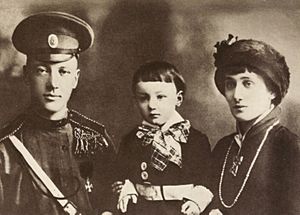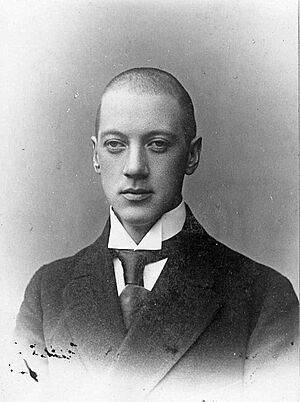Nikolai Gumilev facts for kids
Nikolai Stepanovich Gumilev (born April 15, 1886 – died August 26, 1921) was an important Russian poet, writer, traveler, and military officer. He helped start a poetry style called Acmeism. He was married to the famous poet Anna Akhmatova and was the father of Lev Gumilev, who became a well-known historian. Nikolai Gumilev was arrested and executed by the Cheka, which was the Soviet secret police, in 1921.
Contents
Early Life and First Poems
Nikolai Gumilev was born in Kronstadt, a town on Kotlin Island. His father, Stepan Yakovlevich Gumilev, was a naval doctor. As a child, he was sometimes called "Montigomo," meaning "Hawk's Claw." He went to school in Tsarskoye Selo, where a poet named Innokenty Annensky was his teacher. Gumilev later said that Annensky inspired him to write poetry. He also spent some time in Tbilisi, Georgia, attending school there.

His very first poem, I Ran from Cities into Woods, was published on September 8, 1902. In 1905, he released his first collection of poems called Conquistadors’ Way. These poems were about exciting and unusual things, like giraffes near Lake Chad and Caracalla's crocodiles. Even though Gumilev was proud of it, many critics thought his writing style was not very good yet. He later called it "apprentice's work."
From 1907, Nikolai Gumilev traveled a lot in Europe, especially in Italy and France. In 1908, his new collection Romantic Flowers came out. While in Paris, he started a literary magazine called Sirius, but only three issues were ever printed. When he returned to Russia, he worked on and wrote for an art magazine called Apollon. During this time, he was involved in a literary dispute with Maximilian Voloshin over a writer using the pen name "Cherubina de Gabriak."
Gumilev married Anna Akhmatova on April 25, 1910. He wrote some poems for her. Their son, Lev, was born on September 18, 1912. Lev later became an important historian.
Adventures in Africa
Nikolai Gumilev loved Africa and traveled there almost every year. He explored new places, sometimes hunted lions, and even helped with development in Ethiopia. He gave a large collection of African items to the Museum of Anthropology and Ethnography in Saint Petersburg. His important book, The Tent (1921), gathered his best poems about Africa, including one called "Giraffe."
The Guild of Poets
In 1910, Gumilev was influenced by the Symbolist poet Vyacheslav Ivanov. Gumilev and his wife Akhmatova often went to Ivanov's poetry gatherings.
Gumilev was not happy with the unclear, mystical style of Russian Symbolism, which was very popular in Russian poetry then. So, he and Sergei Gorodetsky created the Guild of Poets. This group was like the old craft guilds in Europe. They believed that writing poetry needed skill and hard work, just like building a cathedral. To show their ideas, Gumilev published two collections: The Pearls in 1910 and The Alien Sky in 1912.
The Guild's new style of poetry was called acmeism. The idea was that anyone, no matter their talent, could learn to write good poems if they followed the masters of the guild, like Gumilev and Gorodetsky. They looked up to the French poet Théophile Gautier. This new approach, along with the colorful and exotic topics in Gumilev's poems, attracted many young people to the Guild. Several famous poets, such as Georgy Ivanov and Vladimir Nabokov, learned from Gumilev, even if not formally.
War Experiences
When World War I began, Gumilev quickly returned to Russia and eagerly joined an elite cavalry unit. He fought bravely in battles in East Prussia and Macedonia. For his courage, he received two St. George crosses (medals for bravery) in 1914 and 1915.
His poems about the war were put together in a collection called The Quiver (1916). In 1916, he wrote a play in verse called Gondla, which was published the next year. This play was performed in Rostov na Donu in 1920.
During the Russian Revolution, Gumilev was serving with the Russian forces in France. Even though he was advised to stay away, he quickly went back to Petrograd. There, he published several new collections, Tabernacle and Bonfire. He also divorced Akhmatova in August 1918. The next year, he married Anna Engelhardt, who was a noblewoman and the daughter of a famous historian.
His Execution
In 1920, Gumilev helped start the All-Russia Union of Writers. He openly shared his views against the communist government. He also showed his dislike for the "half-literate Bolsheviks." On August 3, 1921, he was arrested by the Cheka, the secret police. He was accused of being part of a conspiracy against the government, though this conspiracy likely did not exist.
On August 24, the Petrograd Cheka ordered the execution of 61 people involved in this case, including Nikolay Gumilev. They were executed by a firing squad on August 26 in the Kovalevsky Forest. His friend and fellow writer, Maxim Gorky, rushed to Moscow to ask Lenin to save Gumilev, but it was too late.
Legacy and Influence
Gumilev's execution had a lasting impact on his wife Akhmatova and their son, Lev. Lev was arrested later in the 1930s and spent almost twenty years in prison camps.
Even after Gumilev's execution, his play Gondla was performed again in Petrograd in January 1922. It was a big success. However, when the audience called for the author, who was now officially considered a "traitor," the play was removed from the theater.
In February 1934, the poet Osip Mandelstam quoted words from Gondla to Akhmatova: "I am ready to die." She later repeated them in her own famous poem, "Poem without a Hero."
Although his work was banned in Soviet times, Gumilev was loved for his youthful desire for travel and for animals like giraffes and hippos. His poem "The Tram That Lost Its Way" is thought to be one of the greatest poems of the 20th century.
- The Russian progressive rock band Little Tragedies has used Gumilev's poetry in many of their songs. They even have four albums completely based on his poems.
- In 2016, an English translation of his play Gondla was published by an Irish poet, Philip McDonagh. A theater production of the play also toured in Ireland.
See also
- Silver Age of Russian Poetry
- 4556 Gumilyov, an asteroid named after him
- List of famous duels
Russian people in Ethiopia
- Alexander Bulatovich
- Leonid Artamonov
- Nikolay Leontiev
 | Bayard Rustin |
 | Jeannette Carter |
 | Jeremiah A. Brown |



